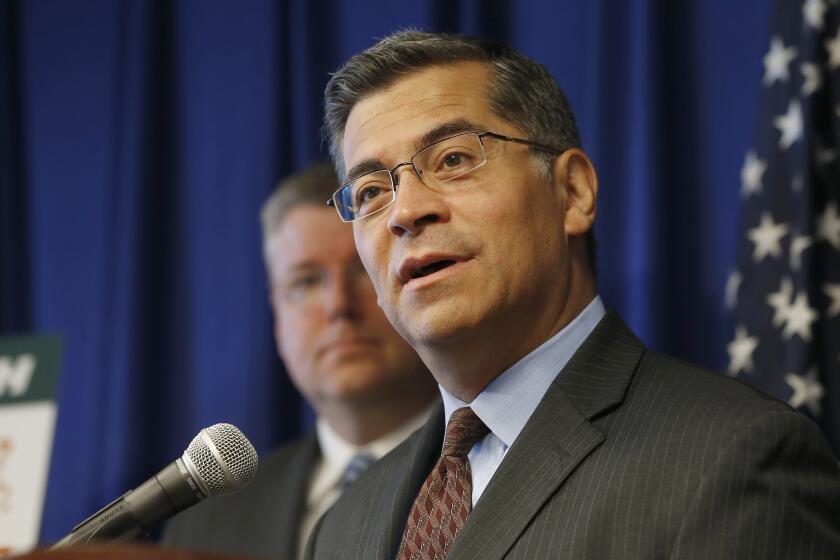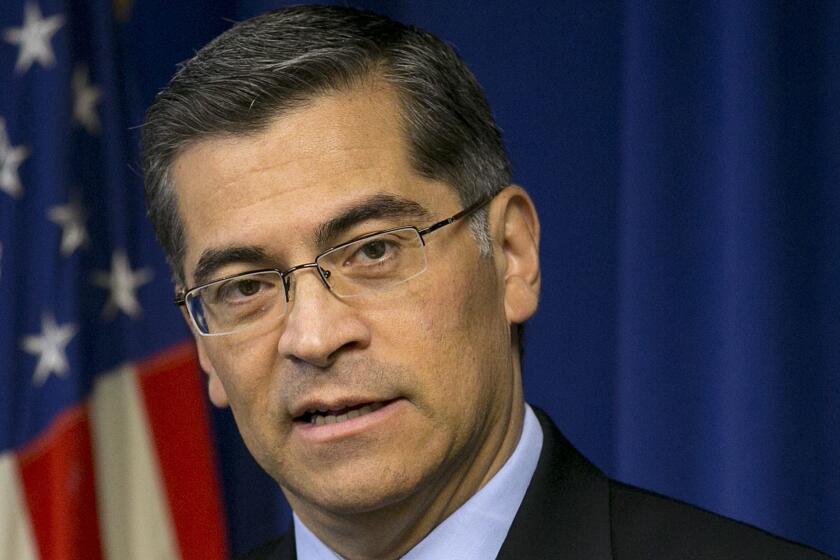The attacks on Becerra as Biden’s HHS nominee are amazingly dishonest. Here’s why

- Share via
One can count on Republicans always offering incoming Democratic administrations the same prescription for success. Democratic presidents will do just fine, they say, as long as they act like ... Republicans.
That’s the theme of some early Republican and conservative objections to some of President-elect Joe Biden’s cabinet picks.
We’ve already addressed the attacks on Neera Tanden, who will be nominated to head the Office of Management and Budget — she’s real progressive, the complaints go, and also she’s been known to wield a poison pen on Twitter. Big deal.
Even Trump chose a physician and then a pharmaceutical executive for the H.H.S. post.
— New York Times columnist Ross Douthat, praising Trump’s disastrous appointees
The other big Republican target is shaping up to be California Atty. Gen. Xavier Becerra, who will be nominated as secretary of Health and Human Services.
Becerra is taking fire for having thwarted numerous Trump initiatives aimed at rolling back environmental protections and undermining rights to healthcare guaranteed by the Affordable Care Act and other federal laws.
The choice, asserted the right-wing Washington Examiner, indicates that Biden “plans to use the agency to mount an aggressive challenge to religious liberty interests.”
Another line of attack is that Becerra doesn’t have hands-on healthcare experience. “It’s kind of like having a pacifist (or) somebody without experience in defense being the Secretary of Defense,” said Sen. Bill Cassidy, R-La.
Doctors at California’s Hoag Memorial Hospital are fed up with religious interference.
As my colleague Jennifer Haberkorn reported, the ever-perplexed Sen. Susan Collins, R-Maine, said she was “surprised that it wasn’t an individual who had a healthcare background.”
Undergirding the attack on Becerra is the ginned-up notion that he’s some sort of wild-eyed radical activist. The National Review pointed to his “bizarre and misplaced extremism.”
And here’s Ross Douthat, a right-wing columnist at the New York Times, calling Becerra “a partisan politician from a deep-blue state whose health care experience is mostly in legal battles with the Trump White House over Obamacare, rather than in health policy or medicine itself.”
Odd: I would have thought that challenging President Trump’s legal attack on the Affordable Care Act was absolutely in the mainstream of health policy.
But before delving deeper into what these critics describe as “extremism” and partisanship, it behooves me to point out Douthat’s column achieved one of the truly spectacular self-owns in the history of punditry by his sniffingly observing that “even Trump chose a physician and then a pharmaceutical executive for the H.H.S. post.”
Douthat is joshing us, right? Let’s remember that the physician in question was Tom Price, who was drummed out of his job by a scandal related to his use of private and military planes on government business at a cost to taxpayers of more than $1 million.
Price’s tenure of 231 days was the shortest of any duly-appointed health secretary, but not so short that it kept him from supporting a GOP measure that would have eviscerated the Affordable Care Act and increased the number of uninsured Americans by 23 million.
Giant Sutter Health says coronavirus crisis warrants renegotiating antitrust settlement. Don’t believe it
That’s some recommendation, Ross.
Price’s successor, former pharmaceutical executive Alex Azar, has presided over the destruction of the reputation and credibility of two of the most important agencies under HHS, the Centers for Disease Control and Prevention and the Food and Drug Administration.
On Azar’s watch, more than 300,000 Americans have died from COVID-19. That’s the worst record in the world and, by a large margin, the worse failure of public health policy in American history. (Raise your hand if you don’t think Azar will be returning to the pharmaceutical industry promptly after Jan. 20. Anybody?)
Is Douthat really suggesting that this distinguished pair were good choices for HHS secretary?
But since Douthat, Cassidy, Collins and other critics are so deeply concerned about Becerra’s healthcare bonafides, I’d like to introduce them to the following names: Mike Leavitt, Tommy Thompson, Margaret Heckler, Richard Schweiker, F. David Matthews, Caspar Weinberger, Eliot Richardson, Robert Finch, Arthur Flemming, Marion B. Folson and Oveta Culp Hobby.
These people all have two things in common. One: They were all appointed by Republican presidents as secretaries of Health and Human Services or its predecessor agency, the Department of Health, Education and Welfare.
Two: Not a single one had experience in medicine or healthcare administration before getting the job. (The list includes four lawyers, three educators, three business executives and one career government official.)
Now let’s examine Becerra’s record as California attorney general. It’s true that he has been an energetic litigant against the Trump administration with some 100 lawsuits and legal motions to his credit, many of them brought in conjunction with other states.
What the critics seldom acknowledge is that California won most of those actions, which were overwhelmingly brought to uphold environmental standards, legal protections for immigrants and anti-discrimination laws benefiting LGBTQ people, and other public values.
Concerns about religious restrictions on care helped to block a big hospital merger in California.
Becerra successfully fought off Trump’s effort to rescind Deferred Action for Childhood Arrivals, or DACA, the Obama-era program barring deportation of undocumented immigrants brought to this country as children. He staved off a Trump assault on California’s nation-leading vehicle emission standards long enough to give Biden an opportunity to cancel the attempted rollback.
Douthat and other conservatives are especially irked at Becerra’s lawsuit aimed at upholding the ACA’s mandate for contraceptive coverage against an attack by the the Little Sisters of the Poor, a Catholic congregation.
Under the Obama administration, the Little Sisters were offered the same accommodation as other Catholic employers — namely that they could transfer their legal obligation to provide for contraception in their health plans by shunting the obligation off to the health plans.
That wasn’t enough for the Little Sisters, which maintained that even allowing the obligation to be transferred was tantamount to assuming it themselves.
Becerra sued to block a Trump rule that would have expanded religious exemptions to the law. He won in federal court and again at the appellate level, but the rule was ultimately upheld by the Supreme Court.
To the National Review, this reflects Becerra’s habit of “marshalling the forces of the state to crush religious dissenters.” (Leave aside that he was suing to uphold a federal law.)
The National Review, by the way, also objected to Becerra’s blocking the merger of hospital chains affiliated with the Catholic and Seventh-Day Adventist churches.
As we reported, Becerra’s concern appeared to be that giving more local power to two chains that restrict women’s healthcare would be a negative for their local communities. To the National Review, Becerra took this “because the resulting consolidated chain could reduce access to both abortion and gender-reassignment surgeries.”
When big hospitals merge, the merger partners’ mantra is almost always the same: The deal will deliver lower costs to the lucky patients, with no sacrifice in quality.
Becerra’s critics haven’t really come to grips with his whole record. They haven’t noticed, for instance, his hands-off approach to an attempt by Hoag Hospital of Newport Beach to extricate itself from an affiliation with Providence Health, which has been placing increasingly stringent Catholic church-based restrictions on Hoag healthcare despite contractual promises not to do so.
Becerra has statutory authority over that relationship, and has irked Hoag advocates by staying out it.
Nor do they tend to mention Becerra’s successful antitrust lawsuit against the northern California hospital chain Sutter Health. That case resulted in a $575-million settlement and exposed how hospital mergers drive up costs for patients.
The truth is that these criticisms of Becerra’s record are the height of cynical and hypocritical partisanship. Nothing about Becerra’s actions as California A.G. is radical or extremist — they’ve been aimed almost invariably at protecting existing federal and state laws from being trashed by Trump’s Visigoth horde.
That federal judges have agreed with Becerra more often than not should put to rest any notion that he’s working far from the mainstream of policy.
As for whether Becerra is qualified to run HHS, that sort of objection should make you laugh, considering the gang of misfits and vandals that Trump paraded past the stands and into positions of responsibility, with nary a dissenting vote from GOP senators.
Trump’s appointees have taken jackhammers to work and reputations of the Environmental Protection Agency and departments of State, Homeland Security, Interior and Labor, among many other government bodies.
Biden’s most difficult challenge will be putting them back together after four years of ruination, and Becerra’s will be to bring professional management back to Health and Human Services. The conservative and GOP opposition to his appointment is merely a sign that they don’t want that to happen.
More to Read
Inside the business of entertainment
The Wide Shot brings you news, analysis and insights on everything from streaming wars to production — and what it all means for the future.
You may occasionally receive promotional content from the Los Angeles Times.















